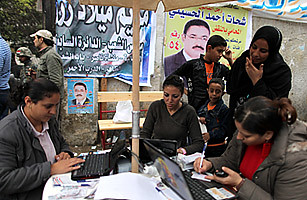
Egyptian Coptic Christians registering people to vote. The Islamist parties have won a large majority in the parliamentary elections., a photo by Pan-African News Wire File Photos on Flickr.
Egyptian Copts abandon constitution talks
Mon Apr 2, 2012
5:57pm GMT
CAIRO (Reuters) - Egypt's Coptic Orthodox Church has announced it is withdrawing from talks on a new constitution, saying Islamist domination of the drafting body made its participation "pointless", Egypt's state news agency said.
The decision late on Sunday came after Egyptian liberals called for a boycott of the drafting committee, which is seen as failing to represent the nation's diversity.
"The Coptic Orthodox Church General Council agreed with the approval of all of the council's 20 members to withdraw from the constitutional assembly... as it found it was pointless for the church to be represented following the comments made by the national forces about the way the assembly was formed," the state news agency said, quoting a church statement.
The current constitution was suspended by the country's army rulers in February last year shortly after they took power from Egypt's long-serving autocratic president, Hosni Mubarak.
Selected by parliament, the 100-member constitutional assembly is dominated by Islamists, reflecting their victory in parliamentary elections.
Coptic Christians, who form Egypt's biggest minority group and constitute most of Egypt's 10 percent Christian population, have long had a difficult relationship with the country's overwhelmingly Muslim majority.
Egypt's Coptic Catholic and Evangelical churches also expressed their disapproval of the constituent assembly writing the constitution, state news agency MENA said.
The Coptic Catholic church on Monday notified Field Marshal Hussein Tantawi, the head of the ruling army council, that it had been "completely disregarded" in the assembly, it said.
The Evangelical church also announced it would not take part in talks on a new constitution because it did not approve of the way the assembly was formed, the news agency added.
Since Mubarak's removal, Christians have become increasingly worried after an upsurge in attacks on churches, which they blame on hardline Islamists, though experts say local disputes are often also behind them.
The death of Coptic Pope Shenouda last month has added to those worries as it left Christians wondering how to make their voices heard as Islamists rise to power.
The new constitution is eagerly awaited by many Egyptians. It is expected to include more freedoms and define rules for the authorities, including setting out the terms of presidential power. During the 30-year-rule of Mubarak, the post carried absolute power.
Many liberal parties and public figures along with the state's top Islamic authority of al-Azhar have previously announced their withdrawal from the assembly.
(Reporting by Ali Abdelattai, Yasmine Saleh and Shaimaa Fayed; Writing by Yasmine Saleh; Editing by Michael Roddy and Andrew Osborn)
No comments:
Post a Comment